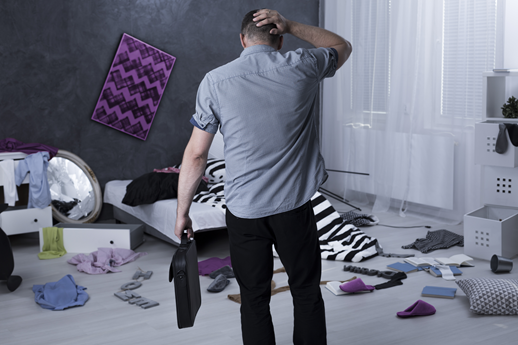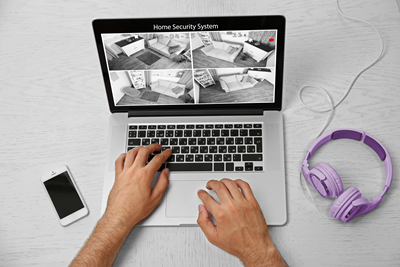
A burglary is a profoundly distressing experience that can trigger many emotions, including anxiety, fear and anger. But it’s important to remember that it’s not your fault, and to know what to do after you’ve been burgled
In this article, we provide a clear guide on the steps to take after a break-in, including helpful tips on preventing it from happening again
EASY AS HACK
If you’re burgled, document any stolen items for insurance claims as soon as the police have finished collecting evidence.
At a glance
Call the police on 101 immediately after a burglary and don’t touch anything. Report any missing items or documents to your insurer, the bank and any other relevant authority.
what to do after a burglary?
You should take the following steps after a burglary[1]:
- Call the police on 101 immediately after a break-in
- Dial 999 if the burglary is still in progress – that’s an emergency
- Don’t touch anything that the burglar may have handled, so you do not disturb the evidence
- If you were there during the burglary, try to recall anything the offender touched and tell the police
- Cover and preserve evidence that could identify the offender, such as wet footmarks
- Jot down a description of their vehicle, if you saw it, and what the offender looked like
- List anything that’s missing or damaged in your home
- Contact your bank or building society immediately if your bank cards were stolen
- Report the theft or loss of missing ID documents to the issuing authority, such as the DVLA[2] for your driving licence.
call the police
You must call the police immediately after a burglary because it improves their chances of catching the criminals who burgled your home.
The police should provide you with a crime reference number, allowing you to claim through your home insurance provider. Remind them, if they haven’t, as it’s essential to open a record of the incident with the police for any insurance claims you want to make.
In the event of a burglary, you can make a claim through your contents insurance for any personal belongings that are stolen or damaged, as long as they’re covered by your policy. If there is any damage to the structure of the property, this would need to be addressed through your buildings insurance policy.
don't touch anything
Your first instinct after a burglary may be to tidy up your home. It’s natural to want to sweep up broken glass from a smashed window or replace any drawers the thieves rifled through to steal your property.
However, you mustn’t touch anything as your home is now a crime scene. You don’t want to contaminate crucial evidence that the police might use later to link offenders to burglaries.
Evidence the police need includes:
- Fingerprints – where the offender entered, such as door handles and window frames, or cups of tea or glasses of water they asked for while they distracted you [2]
- Footprints – outside your home or inside if the burglar had wet shoes.[2]
- Cover them with a bucket or plastic tub to preserve them
- Tool marks – from anything they used to break in, such as a crowbar, hammer or screwdriver
- Torn fabric – examples include where a burglar grabbed you, ripped curtains when they broke in or discarded clothing
- DNA (deoxyribonucleic acid) samples – including blood, hair or body fluids, which might be at the scene.[3]
You should take photos as additional evidence to share with your insurance company if needed.
cancel any stolen cards
You can start looking around your home for missing items once the police have gathered the evidence. It’s essential to report a stolen personal ID to the relevant organisation. Burglars will often target your ID to commit crimes like identity theft and extortion.[4]
- Call your bank, building society or credit card company immediately if your bank, credit cards or cheque books have been stolen
- Report a stolen passport to the Home Office
- Tell the DVLA that burglars stole your driving licence
- Contact any finance providers if you can’t find a phone, laptops or tablets containing your bank account information and logins
- You can also report fraud and cybercrime to the police via Action Fraud, the UK’s fraud and cybercrime reporting hub.
You can report a claim to us online at ageas.co.uk/claims or call us on the number from your policy documents.
call your mobile phone provider
If the offender stole your mobile, you must contact your mobile phone provider immediately to suspend your account. You want to avoid paying for unauthorised calls. Your network provider will:
- Block the phone and stop anyone from using it. They should also provide you with a reference number which you need to provide when claiming on your home insurance policy.
- Pass on the phone’s identification number (IMEI – International Mobile Equipment Identity,a unique number for identifying a device on a mobile network)
- Tell you to give the IMEI to the police.[5]
create an inventory
Walk through each room and make a list of everything that has been damaged or stolen. Collecting additional information while the event is fresh in your memory helps the police and is helpful in an insurance claim.
Provide as much detail as possible about each item, including serial numbers if available.
- Take pictures of your damaged property, including windows, doors, jewellery boxes, safes, chests of drawers, wardrobes, lamps and other objects
- Dig out any receipts you might have kept for the missing or smashed property
- Find any previous photos you’ve taken of your jewellery and other goods
- If you have a doorbell or security camera, check whether you have footage of the break-in to give to the police
- Tell the police if your phone has an activated tracking app on it (do not track the phone, as it could be dangerous for you if it ends in a confrontation).[6]
Don’t throw away anything that might be needed for inspection by your insurer, so that you can inform the police first and then your insurer.
contact your home insurance provider
You should contact your home insurance provider as soon as possible and file a claim. It’s a good idea to review your policy beforehand, to make sure you are covered and to know what to provide when making a claim, such as receipts for high-value items or photographs of the damage.
Inform your insurer of what occurred and provide them with the crime number. Typically, they’ll send a loss adjuster to investigate the incident.
You must now secure your home. Be sure to keep the receipts if you need to call a glazier or locksmith to help protect your property after a burglary. You may be able to claim the money back if you have home emergency cover.
Review our contents insurance.
getting support
You and your family may find it distressing to spend the first night at home after a burglary, or feel anxious and emotional for some time after the event.
The police may refer you to the following support services, or you can contact them yourself.
Victim Support offers free counselling, help and advice to victims of crime. Here’s where you can reach them:
- England and Wales – Victim Support or 08 08 16 89 111
- Scotland –Victim Support Scotland or 0800 160 1985
- Northern Ireland – Victim Support NI or 028 7137 0086 (Foyle Hub), 028 9024 3133 (Belfast Hub)
Victim and Witness Information is another source. It provides free, confidential, independent support by area.
The NHS also offers counselling and therapies.
how can i protect my home from burglars?
You can protect your home from burglars in the future by making it more secure:
- Home security – invest in additional home security, including new locks if necessary. Measures that deter burglars include bright exterior lighting, accredited burglar alarms, CCTV, doorbell cameras, and locked garden gates.
- Installing a safe – it’s a good idea to invest in a safe where you can keep your valuables
- Plant thorny hedges – prickly hedges, such as pyracantha, along boundaries, make it more challenging for thieves to climb over and through.[7]
- Lay noisy gravel – burglars try to avoid being noticed, so if you have a driveway or path providing access to your home, lay it with crunchy-sounding gravel [8]
- Keep doors and windows locked and chains on – burglars won’t have easy access to the home if you have locked your doors and windows, even when you’re in
- Put the chain on – if there’s someone at the door, check who’s there, and don’t open it until the chain is on first.[9] Always ask for ID.
- Lock ladders away – don’t leave any ladders outside, as this provides easy access to your home
- Don’t leave valuables on display – burglars could target your house for this reason, so hide any expensive or sentimental items so no one can see them.
- Join your local Neighbourhood Watch – these schemes unite communities, and some schemes include a review of your property and advice.
The police may also suggest marking your valuables with a mark that’s only visible under ultraviolet light, making it easier for them to identify stolen goods and more complicated for thieves to sell them on.[9]
how can you make an insurance claim after a burglary?
To make an insurance claim after a burglary, check your policy wording first to make sure what is covered and contact your insurance provider straight away.
Here’s how to make a home insurance claim with Ageas.
faqs
how can home insurance help when i've been burgled?
Home insurance can help cover the cost of repairs and replace items stolen by burglars.
how can i deter burglars from my home?
Lock all doors and windows, install home security, lock ladders away, put the door chain on, don’t leave valuables on display, plant prickly hedges and lay down crunchy gravel.
should i make a list of what has been stolen?
Yes, you should make an inventory list of what is missing for the police and your insurance provider.
How can I protect my home from a burglary when on holiday?
Cancel any deliveries, so that no one can see items left on your doorstep, making it evident that you are away. Have someone park a car in your driveway overnight. Put lights, TVs or radios on a timer that switches them on to give the impression someone is home.
Sources
[1] https://www.askthe.police.uk/view-category/?id=42c7e112-6ad2-eb11-bacb-000d3ad61986
[4] https://www.barrybros.com/2022/08/the-top-7-things-burglars-steal-and-where-they-look/
[6] https://www.victimsupport.org.uk/crime-info/types-crime/burglary/theft-checklist/
[7] https://www.housebeautiful.com/uk/garden/plants/news/a3202/best-burglar-deterrent-plants-for-home/
[8] https://www.police.uk/cp/crime-prevention/protect-home-crime/keep-burglars-out-property/
[9] https://www.police.uk/cp/crime-prevention/protect-home-crime/mark-your-property/


